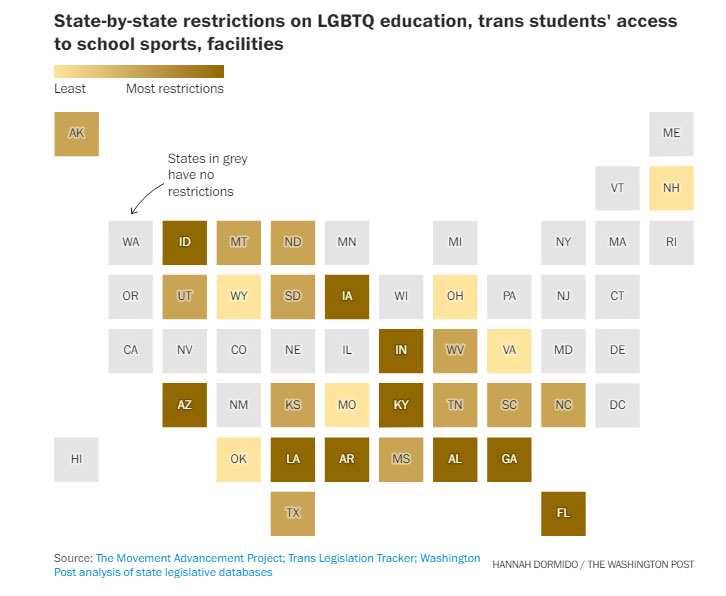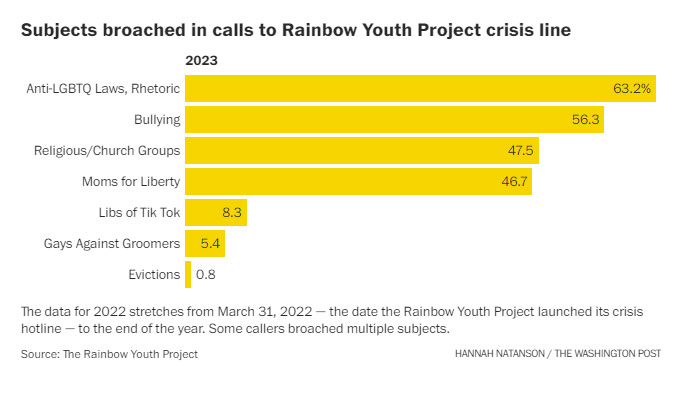States that have passed legislation targeting LGBTQ+ rights have seen a significant increase in bullying and hate crimes in schools, according to a Washington Post analysis of FBI data.
The number of anti-LGBTQ+ school hate crimes reported nationwide to authorities more than doubled between 2015 to 2019 and 2021 to 2022. There were an average of 108 anti-LGBTQ+ hate crimes at schools reported to the FBI per year from 2015 to 2019 on both college and K-12 campuses. In 2021 and 2022, the average more than doubled to 232.
The increase was even steeper in the 28 states with laws restricting LGBTQ+ students’ education or rights, nearly tripling from an average of 28 per year to 90 per year. There was also an increase in states without these laws, from 79 reported hate crimes per year to 140.
The increase is even more steep when limiting the data to just K-12 schools. In states that have enacted restrictive laws, there were more than four times the number of reported LGBTQ+ hate crimes. FBI data shows the most common crimes associated with reported hate crimes in schools include simple assault, intimidation, and vandalism.
“Policy sets the tone for real-world experiences [and] discriminatory policy just creates a hostile environment,” Amy McGehee, a doctoral student at Oklahoma State University who researches LGBTQ+ health and well-being, told the Post.
McGehee also noted that LGBTQ+ students reported feeling unsafe on both college and K-12 campuses before states started increasingly passing anti-LGBTQ+ policies. According to a 2023 poll from the Post and KFF, school is among the greatest stressors for transgender children in particular, with 45% of trans adults reporting they felt generally unsafe at school as a child or teenager compared with 10% of cisgender adults. Another 2023 poll from the Human Rights Campaign (HRC) found that 46% of LGBTQ+ youth, including 54.9% of trans and gender-expansive youth, feel unsafe in at least one school setting.
According to HRC, a third of the over 550 anti-LGBTQ+ bills introduced in state houses last year were attacks on any form of LGBTQ+ inclusion in the classroom with a disproportionate impact on transgender youth.

Source: Washington Post, FBI
School Hate Crimes in Liberal States
Notably, the Post’s analysis of FBI data found that per capita hate crime rates on K-12 and college campuses were higher in the more liberal states that have not enacted laws limiting transgender rights. Stephen Russell, a University of Texas at Austin professor who studies anti-LGBTQ+ youth issues, told the Post that LGBTQ+ youth and families living in those 22 states were probably more likely to report violence and harassment since many have adopted laws and school policies specifically prohibiting bullying or discrimination against LGBTQ+ students.
“It creates a context where they see themselves, they stand up for themselves, they believe there is a place for them in their schools,” he said.
Lanae Erickson, a senior vice president at Third Way who studies social policy and politics, told the Post that it’s also possible more kids are open about their identities in more liberal states, creating more potential for bullying.

Source: Washington Post, The Movement Advancement Project
Calls to LGBTQ+ Youth Crisis Hotlines Skyrocket
Crisis hotlines geared toward LGBTQ+ youth have also seen a spike in calls. In the fiscal year ending in July 2022, the Trevor Project fielded around 230,000 reports, including phone calls, texts, and online chats. The following year, the group fielded more than 500,000.
The Rainbow Youth Project saw calls to its hotline increase from an average of around 1,000 per month in 2022 to over 1,400 per month in 2023. The top reason cited by callers last year was anti-LGBTQ+ and political rhetoric.

Source: Washington Post, Rainbow Youth Project
In the weeks following the death of student Nex Benedict, the Rainbow Youth Project saw a spike in calls from Oklahoma, rising from 321 in January to nearly 1,100 in February. The Post notes the surge may have been partly driven by news coverage of the group’s work.
Nex, who used they/them pronouns, died on Feb. 8, the day after a confrontation with three older female students in a bathroom at Owasso High School. An autopsy report determined Nex died by suicide. Nex had allegedly been bullied for months, with harassment reportedly starting shortly after Oklahoma passed its transgender school bathroom law prohibiting students from using bathrooms that do not align with the sex assigned at birth.
On March 7, the U.S. Department of Education’s Office for Civil Rights announced it had opened an investigation into Owasso Public Schools at the request of HRC. The group alleges Owasso High School violated Title IX by failing to address documented instances of bullying, violence, and harassment.
Oklahoma Schools Superintendent Ryan Walters has voiced support for the state’s anti-LGBTQ+ laws, stating he will continue to push for legislation to counter “radical gender theory,” which he defines as the notion that a person’s gender can differ from their biological sex.
“There’s two genders. That’s the way God created us,” he said. Some young people are focused, he added, but “your job as an adult is to help kids, not lie to them.”
A bill is being considered this year in Oklahoma that would force schools to teach that “a person’s sex is an immutable biological trait.”







